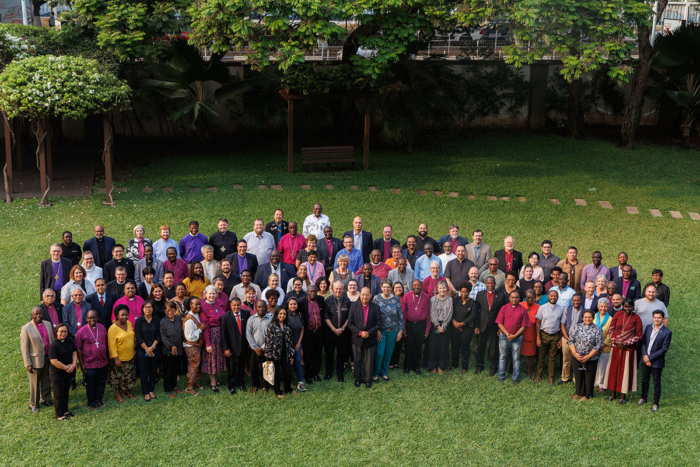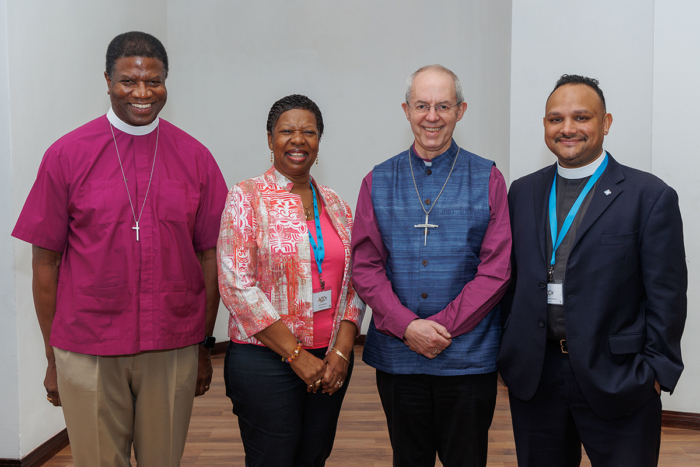Episcopal ACC members return from Ghana with stories of engaging with Anglicans around worldPosted Feb 21, 2023 |
|

A group photo of the delegates to the 18th Anglican Consultative Council held at the Accra Marriott Hotel, Accra, Ghana. Feb. 12-19, 2023. Photo: Neil Turner/Anglican Communion Office
[Episcopal News Service] The three Episcopal members of the recently concluded 18th Anglican Consultative Council returned to their home dioceses this week encouraged by their experiences developing closer relations with Anglicans around the world through their shared mission in Christ.
About 110 members from 39 Anglican provinces attended the Feb. 12-19 meeting in Accra, Ghana, for prayer, worship and discussions of the operations, ministries and mission of the worldwide Anglican Communion. The communion is made up of autonomous, yet interdependent churches that all have historic roots in the Church of England.
The Episcopal Church was represented by Maryland Bishop Eugene Sutton, the Rev. Ranjit Mathews, the Diocese of Connecticut’s canon for mission, advocacy, racial justice and reconciliation, and Annette Buchanan, a lay leader in the Diocese of New Jersey and former president of the Union of Black Episcopalians.
In a joint Zoom interview with Episcopal News Service on Feb. 17, Sutton, Mathews and Buchanan discussed some of the week’s highlights, as well as notable actions taken by ACC-18 and their expectations for The Episcopal Church’s future engagement with other Anglican provinces.
“The emotional high point of this week was the visit to the slave castle,” Sutton said, referring to ACC-18’s trip on Feb. 15 to Cape Coast Castle. The site once served as a headquarters for British involvement in the transatlantic slave trade. Enslaved Africans were held in dungeons at the castle with squalid, overcrowded conditions and little ventilation, until they were boarded onto ships destined for North and South America and the Caribbean. Anglican worship services were conducted in a church over the dungeons.
“That has really highlighted at this ACC issues of oppression, racial injustice, reconciliation and reparations,” said Sutton, himself a descendant of slaves. He said he later affirmed on the floor of the ACC meeting, “the gospel proclaimed by those slave owners is not that Gospel that I know, and we know.”
Sutton, Mathews and Buchanan also took the lead in drafting with other ACC members a resolution that was approved on Feb. 18, the last business day of this meeting, that outlined some of the themes evoked by the Cape Coast Castle visit.
The resolution “laments the widespread historic involvement of the church in the transatlantic slave trade” and “recognizes the visit to Cape Coast Castle and the ensuing reconciliation service serves as an invitation to deeper historical investigation, education and theological reflection across the Communion.” In adopting the resolution, the ACC also called on the provinces to work with the Anglican Communion Office “to devise a program of work that seeks to address past damage and combat modern manifestations of this evil.”
Buchanan said she would like to see the ACC further help Anglicans around the world who are not familiar with such historical examples of oppression and racism “to wrestle with this issue and come up with resources for the rest of the [Anglican] Communion.”
At the meeting in Ghana, Buchanan said she was able to share stories with other ACC members of how The Episcopal Church has worked to confront its own historic complicity in systems of oppression in the United States, such as slavery and its legacy and segregation. Those stories have elements in common with some of the stories that other ACC members shared about their struggles against colonialism, Buchanan said.
“That thread of colonialism still exists in our context” in The Episcopal Church, she said, “and the good news for us is we recognize it and are working through it.”
Another prominent resolution adopted by ACC-18 called for development of proposals to embody “good differentiation” between the provinces that disagree theologically on issues of human sexuality. The conservative leaders of some provinces in what is known as the Global South, mostly Africa, Asia and South America, have suggested that the persistence of impaired relations over those issues will require structural reforms to the four Anglican Instruments of Communion.
Despite the evidence of such tensions on the sidelines of this ACC, Mathews said he was impressed by the collegiality he experienced interacting with ACC members from other provinces. Their churches’ differences over LGBTQ+ inclusion did not hinder their engagement with each other.
“We are 39 provinces here that are visibly different in so many different ways, and yet we have tangibly worked together, in fits and starts, on the issues of the day,” he said. “That is the beautiful thing about the communion.”

The Episcopal Church’s delegation—Maryland Bishop Eugene Sutton, Annette Buchanan, a lay leader from the Diocese of New Jersey, and the Rev. Ranjit Mathews, the Diocese of Connecticut’s canon for mission, advocacy, racial justice and reconciliation—to the 18th Anglican Consultative Council poses with Archbishop of Canterbury Justin Welby on Feb. 14 in Accra, Ghana, where the Feb. 12-19 meeting is underway. Photo: Neil Turner for the Anglican Communion Office
The ACC is one of the four Instruments of Communion and the only to include laity. The others are the Primates’ Meeting, the Lambeth Conference of Anglican bishops and the archbishop of Canterbury, known as a “focus of unity.” Archbishop of Canterbury Justin Welby has faced intensifying criticism from conservative Anglicans this month after the General Synod of Church of England, which Welby leads, voted to endorse a plan to allow blessings of same-sex unions while stopping short of approving same-sex marriage rites. Welby said he personally will not offer the blessings.
Some Global South leaders raised similar issues at last summer’s Lambeth Conference as they pursued ongoing criticisms of The Episcopal Church and other provinces that have welcomed LGBTQ+ people more fully into the life of their churches.
Welby indicated at ACC-18 that he was open to reform proposals, saying in his Feb. 12 opening address that he “will not cling to place or position as an Instrument of Communion. … I hold it very lightly, provided that the other Instruments of Communion choose the new shape.”
In response to a question from ENS, Welby clarified at a Feb. 17 news conference that he did not say he was planning to step down. “I wanted to open things up to different ideas, and they will take quite a long time,” he said.
Welby, who is 67, will reach the compulsory retirement age of 70 in 2026.
A group of conservative archbishops, through an alliance called the Global South Fellowship of Anglican Churches, responded on Feb. 20 by saying they rejected the continuation of the archbishop of Canterbury’s historic leadership role in the worldwide communion and would advocate to “re-set the Communion on its biblical foundation.”
Impaired relations were most noticeable at ACC-18 by the absence of members from the provinces of Nigeria, Uganda and Rwanda. Those three have not participated in the Instruments of Communion for at least 15 years because of their objections to some provinces’ ordination of openly gay and lesbian clergy and adoption of marriage rites and blessings for same-sex couples.
ACC actions are not binding on member provinces, though it and the other Instruments of Communion have expressed a commitment to “walk together” despite provinces’ theological and doctrinal differences.
Sutton said the issue of human sexuality “was really a small part” of the ACC’s official business last week in Ghana, with more significant emphases on issues like climate change, environmental justice and church planting. He looks forward to sharing his experiences with fellow Episcopal bishops when they gather in Alabama in March at the next House of Bishops meeting.
“We need the Anglican Communion, the Anglican Communion needs us, even when it’s hard,” Sutton said. “Especially this Instrument [of Communion]. The ACC is worthy of our support.”
Mathews agreed. “We see more of the Gospel when we have everybody at the table,” he said.
The variety of liturgies at ACC-18 offered a notable example of how the experiences of Anglicans around the world can enrich Episcopalians’ understanding of the faith, Buchanan said. “There’s so much information that can flow both ways,” she said. “There’s so much more we can learn from the larger church.”
– David Paulsen is a senior reporter and editor for Episcopal News Service. He can be reached at dpaulsen@episcopalchurch.org.

Social Menu